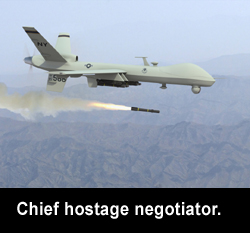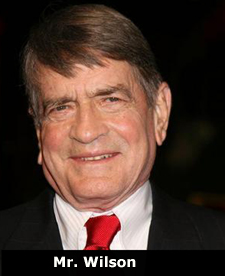There’s more news of drone deaths, this time including western hostages. “Mistakes can occur”, president Obama says, employing the passive voice as his predecessor Ronald Reagan often did. The American captive, aid worker Warren Weinstein, had asked his government to work toward negotiating his release, to no avail. We do not make deals with “terrorists”. Unlike during practically every war our country has been involved in previously, in the context of the “Global War on Terror”, prisoner release negotiations have been barred, whether on the part of the United States government or by private parties, such as the families of the captives. Thus, no release, and ultimately, death by drone.
 What brought this policy about? Perhaps it’s the experience of, again, Reagan and the fallout from the Iran-Contra scandal. The official line at that time was, “we will not negotiate with terrorists”, but the effort towards back-channel negotiations became clear as the story unfolded. Of course, context is important, it seems to me. Back in the eighties, we were deeply involved in the Lebanese civil war, both directly and through Israel’s invasion – that was the proximate cause of the capture of westerners in Lebanon. We were also supporting Iraq’s murderous war against Iran, which no doubt accounts for Iran’s interest in negotiating for arms with American representatives. And then there’s the Contra side of the ledger. Against that bloody backdrop, negotiating for captives seems pretty minor.
What brought this policy about? Perhaps it’s the experience of, again, Reagan and the fallout from the Iran-Contra scandal. The official line at that time was, “we will not negotiate with terrorists”, but the effort towards back-channel negotiations became clear as the story unfolded. Of course, context is important, it seems to me. Back in the eighties, we were deeply involved in the Lebanese civil war, both directly and through Israel’s invasion – that was the proximate cause of the capture of westerners in Lebanon. We were also supporting Iraq’s murderous war against Iran, which no doubt accounts for Iran’s interest in negotiating for arms with American representatives. And then there’s the Contra side of the ledger. Against that bloody backdrop, negotiating for captives seems pretty minor.
As far as I can tell, in every American conflict since the end of World War II, we have referred to our enemies as terrorists. We certainly did it in Vietnam. It’s a pretty simple principle – the other side kills, as do we, but their violence is worse than ours. Ours is justified, even if it’s way beyond the scale of the violence practiced by our adversaries. And so, we express regret when our flying killer robots accidentally blows up an American. No such courtesy when we incinerate nameless Pakistanis, etc.
As in previous conflicts, terrorism is in the eyes of the beholder. Which is why barring negotiations over captives is so nonsensical. If we did it before, we can do it now.
luv u,
jp

 Granted, they were not all his ideas. He was, like many presidents, something of an empty vessel into which various policy mavens and ideologues were able to pour their nasty ideas. Reagan’s son Ron has written of how his father showed the beginning signs of Alzheimer’s while still in office. I have known two people who had occasion to observe him for fairly long periods of time during his term, both of whom told of a man so cloudy minded he needed to be briefed on the basics every fifteen minutes by an extremely protective Secret Service. In that respect, his administration was run by the people around him, just as George W. Bush’s foreign policy was shaped by Rumsfeld, Cheney, Wolfowitz, and others. (If we get a president Palin, that job will be taken up by the likes of Randy Scheunemann. War with Russia, here we come!)
Granted, they were not all his ideas. He was, like many presidents, something of an empty vessel into which various policy mavens and ideologues were able to pour their nasty ideas. Reagan’s son Ron has written of how his father showed the beginning signs of Alzheimer’s while still in office. I have known two people who had occasion to observe him for fairly long periods of time during his term, both of whom told of a man so cloudy minded he needed to be briefed on the basics every fifteen minutes by an extremely protective Secret Service. In that respect, his administration was run by the people around him, just as George W. Bush’s foreign policy was shaped by Rumsfeld, Cheney, Wolfowitz, and others. (If we get a president Palin, that job will be taken up by the likes of Randy Scheunemann. War with Russia, here we come!) mainstream media. This sometimes manifests itself in the form of stories that focus on a reporter’s experience rather than whatever that reporter is witnessing. (Gary Trudeau has offered an extreme example of this with his journalist character Roland Hedley and his perpetually inane Twitter feed.) There’s also the phenomenon of framing complex historical events as being largely the product of one person’s efforts. Probably the best example of this would be Reagan purportedly bringing down the Berlin Wall through the awesome power of speech. And there’s “Charlie Wilson’s War”, the namesake of which – former Texas representative Charlie Wilson – just passed away this week.
mainstream media. This sometimes manifests itself in the form of stories that focus on a reporter’s experience rather than whatever that reporter is witnessing. (Gary Trudeau has offered an extreme example of this with his journalist character Roland Hedley and his perpetually inane Twitter feed.) There’s also the phenomenon of framing complex historical events as being largely the product of one person’s efforts. Probably the best example of this would be Reagan purportedly bringing down the Berlin Wall through the awesome power of speech. And there’s “Charlie Wilson’s War”, the namesake of which – former Texas representative Charlie Wilson – just passed away this week. Whatever his role may have been in providing fuel to the Afghan war effort during the 1980s, this was not the work of one man, any more than the fall of the Berlin Wall was the result of one speech. This ongoing crisis was many, many years in the making, beginning in earnest with the Carter administration and the decision to begin backing the fundamentalist factions within Afghanistan because it was felt that they would prove a longer-term, more pernicious problem for the Soviets than any secularist elements. Money began flowing on a larger scale in the Reagan years as the CIA embarked on what was up to that time the largest operation in their history, conducted in cooperation with the Pakistani ISI and the Saudis. Fanatical fighters were recruited all over the Muslim world, including most notably Osama bin Laden and his cohorts. So we all had a piece of this one, and now it’s got a piece of us.
Whatever his role may have been in providing fuel to the Afghan war effort during the 1980s, this was not the work of one man, any more than the fall of the Berlin Wall was the result of one speech. This ongoing crisis was many, many years in the making, beginning in earnest with the Carter administration and the decision to begin backing the fundamentalist factions within Afghanistan because it was felt that they would prove a longer-term, more pernicious problem for the Soviets than any secularist elements. Money began flowing on a larger scale in the Reagan years as the CIA embarked on what was up to that time the largest operation in their history, conducted in cooperation with the Pakistani ISI and the Saudis. Fanatical fighters were recruited all over the Muslim world, including most notably Osama bin Laden and his cohorts. So we all had a piece of this one, and now it’s got a piece of us.